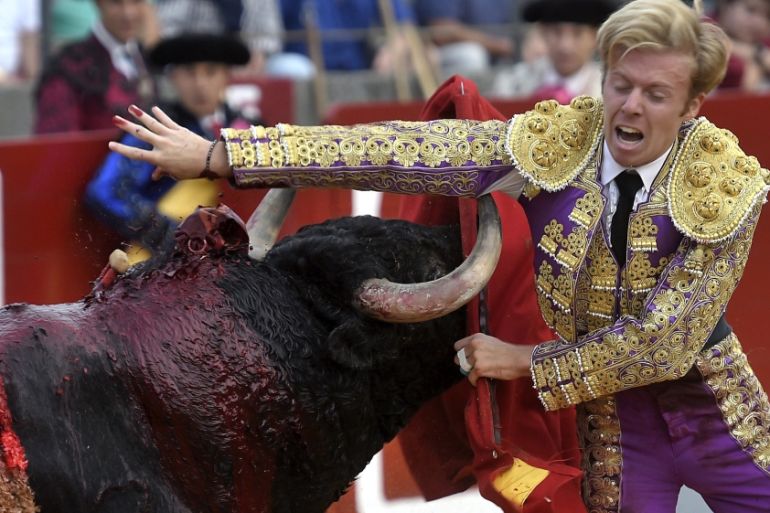Thousands in Spain’s Madrid call for bullfighting ban
Protest part of a growing animal rights movement that has prompted local authorities to crack down on the tradition.

Thousands of people have rallied in the Spanish capital Madrid to call for a ban on bullfighting, adding their voices to a growing animal rights movement that has prompted some administrations to clamp down on the centuries-old tradition.
PACMA, a Spanish political party that promotes animal rights, said that Saturday’s rally was the biggest protest yet against the gory sport, in which a matador brandishing a sword and cape battles a bull in an effort to kill the animal as a public spectacle.
“[It’s] time to end bullfighting and all other bloody spectacles,” a PACMA spokesman said at the rally.
The Madrid protesters held up banners that read “Bullfighting, the school of cruelty” and “Bullfighting, a national shame”.
“Bulls feel and they suffer,” said Chelo Martin Pozo, a demonstrator from the city of Seville who had come to Madrid for the rally.
“Bullfights are a national shame and if they represent me, then I am not Spanish,” she said.
Surveys show public support for bullfighting has waned in recent decades in Spain. An Ipsos Mori poll from January carried out for animal welfare organisation World Animal Protection, found that only 19 percent of adults in Spain supported bullfighting, while 58 percent opposed it.
Bullfighting events, in which audiences watch matadors with red capes and swords confront bulls at close range, are still common in Spain and the practice retains a loyal following across the country.
But opposition to the sport is also gaining force, and each year there has been a decline in the number of bullfights.
“We don’t want Spaniards to be identified with bullfighting. This is not our national fiesta,” Mari Paz Rojo said as she marched through the capital with thousands of other demonstrators.
Politically, the issue has been divisive. Spain’s parliament, under the centre-right government of the People’s Party, moved to protect bullfighting in 2013, declaring it a cultural asset and enabling it to draw on public funding.
But some regions have cracked down on elements of the festivals, including northeastern Catalonia, which banned bullfighting outright in 2011.
READ MORE: Spanish region says adios to bullfighting
Madrid’s leftist mayor, who took over the city council last year, has withdrawn subsidies for bullfighting schools.
This year for the first time, participants in one of Spain’s most controversial festivals, known as the “Toro de la Vega” (Bull of the Plain), will not be allowed to kill the bull.
In June, the country’s anti-bullfighting lobby successfully managed to obtain a ban on a famous Toro de la Vega festival that ended with a bull being speared to death in the region of Castilla y Leon.
Meanwhile Valencia, Spain’s third largest city, has banned the tradition of setting bulls loose with lighted torches attached to their horns – called “bous embolats”.
Spain’s first pro-bullfight lobbying group, the Bull Foundation, made up of breeders, matadors and aficionados, was set up last year.
A number of protest rallies in favour of the controversial pastime have been held recently, such as one in the eastern city of Valencia, a major bullfighting city, which drew thousands of people in March.